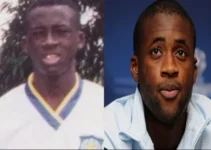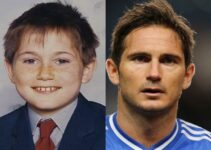Born in the village of Abavo, Delta State, Nigeria, Sunday Oliseh’s journey into football began as soon as he could walk. With a natural affinity for the ball, his talent was apparent from an early age. His family eventually moved to Lagos in search of better opportunities, settling in Lawanson, Surulere, where raising six boys and a girl was no small feat. Yet, despite the challenges, young Sunday stood out. He attended Bright Starr Nursery and Primary School in Ojota, where his passion for football grew, and he quickly became one of the brightest soccer talents in his school.
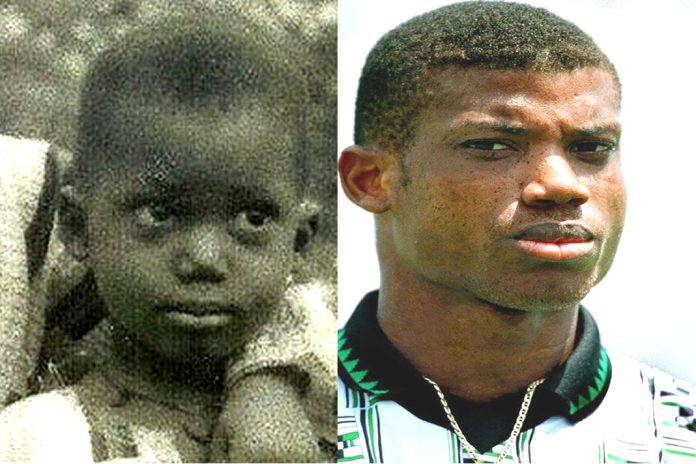
Oliseh’s Football Dynasty: The Early Life, Career and Family Behind the Nigerian Legend
Preamble:
Football wasn’t just a childhood pastime for Sunday; it was his destiny. Though he had no way of knowing just how far his talent would take him, Oliseh would go on to achieve global fame. The pinnacle of his career came in the 1998 World Cup, where he earned the nickname “The Shot Master” for his unforgettable thunderbolt goal against Spain—a moment that cemented his status as a Nigerian football legend.
Football was deeply rooted in the Oliseh family. It wasn’t just Sunday who made a name for himself; his younger brothers, Azubuike and Egutu, also became professional footballers. His brother, Churchill Oliseh, emerged as a highly respected figure in Nigerian football, while his nephew, Sekou Oliseh, continued the family’s football legacy.
This biography delves into the life of Sunday Oliseh, from his humble beginnings to his rise as a Nigerian football icon. We’ll explore his early life, family background, and how his passion for the game transformed not just his life but his entire family’s. Now, let’s dive into the heart of this inspiring story.
Sunday Oliseh Childhood Story – Early Life and Family Background:
Starting off, he bears the full name Sunday Ogochukwu Oliseh. The Nigerian football legend was born on the 14th day of September 1974, in Abavo, Delta State, Nigeria, to Pa Oliseh and his wife. His father worked as an accountant, and his mother is a staunch Catholic and a retired businesswoman.
From the moment he could walk, Sunday was already kicking a ball, showing an early passion for the sport. Though born in Delta State, he was primarily raised alongside his six brothers and one sister in the bustling Lawanson area of Surulere, Lagos State. Football quickly became a major part of his upbringing, setting the foundation for his legendary career.
He is pictured below with his elder brother.
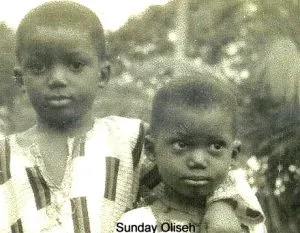
Young Sunday Oliseh in his childhood days.
Research has it that Sunday Oliseh had his primary Education at the Bright Starr Nursery and Primary School (Ojota).
For his secondary school, he went to Ajao Estate High School (Anthony Village) and the Methodist Boys High School, all in Lagos State, Nigeria.
These schools offered him the opportunity to play competitive soccer passionately during sports periods. Due to the natural constraints at the time, Oliseh used every second he had during breaks between classes to play football. Back home, he competed for everything. As Oliseh puts it,
“Right from the time I was a kid, there was competition for everything. There was competition for food, competition for the love of my parents, competition for sitting down on the sofa, … if you don’t sit down early, you will watch VILLAGE HEADMASTER on the floor. I carried this competition into school.”
There was no television station running at noon; therefore, Oliseh would have to play football with his friends to make sure he returned home before his father got back from work. His father often spanks him if he sees him playing football.
Mr Oliseh Snr forbade his son from playing football because of the belief that he had no money or connections and the belief that he knew nobody making a good living out of football.
Road to Fame:
Oliseh’s football was different while playing with his friends because he applied a lot of logic to it, which his friends could not do.
The difference between him and his friends was his ability to apply ‘Jogo Bonito’, which denotes providing great entertainment with the purest footballing moves. This technique originated from Pele and was later adopted by Neymar.
Oliseh continued playing football for fun. Little did he know that football would take his family away from poverty. It so happened that, at a point in his life at school (combining school and playing for his local club), Oliseh was paid his first salary by his local club.
Without hesitation, Sunday took the money home and handed it to his father. His father, both surprised and proud, gathered the rest of the family and said, “Your brother is being paid more than I was as an accountant.” It was at that moment that Oliseh Sr. began to truly believe in his son’s football potential.
Sunday Oliseh Bio – Rise to Fame Story:
In the year 1990, whilst at Julius Berger Fc and still at school, Oliseh received an invitation from Mr. Claude Bissot (may his blessed soul rest in peace)
A Belgian agent facilitated his journey to Belgium for trials. The year was 1990. On the 1st of July 1990, on board, a Swissair flight to Brussels via Zürich, Oliseh went, and all he had was $50, an Adidas sports bag, football shoes, a few belongings, and his most priced article, “The Holy Bible”.
Getting to Belgium, Oliseh realized the first training session was prepared for him. He was surprised the training ended quickly, and the club’s director called the white man who brought him, saying…
“From the explanation you gave of this lad, We thought he was good but didn’t know he was very good. We have agreed to sign him”.
To the agent’s surprise, Oliseh was immediately signed to RFC Liège’s first team on the spot. This marked the pivotal moment when Oliseh secured his place in European football, beginning a permanent journey on the continent.
Oliseh got the moral assistance of Stephen Keshi (playing at Anderlecht at that time), who helped him settle down in Belgium.
After the day Oliseh made his League debut, his coach called and said to him, “I won’t be able to play you more often because you don’t speak the Belgian language”.
Upon hearing that, Oliseh felt sad, saying in his mind, “Having known I spoke a language [Ika Lanuage] which belongs to the minority in Nigeria, Now, here I am, being among the minority again”.
Oliseh quickly crossed the road and went on to buy a language book. In the end, he got to know how to speak French, German, Italian and Dutch.
He saw himself playing at eight clubs, including Ajax, Juventus and Dortmund. The rest, as they say, is now history.
Hafidah and Sunday Oliseh Love Story:
Behind every great man, there’s a great woman, or so the saying goes. And behind almost every ex-Nigerian footballer of Atlanta 1996, there was a glamorous wife or lover.
Oliseh fell in love with Hafidah, an Ethiopian woman and Belgian citizen, during his early career days.
He got married to his beautiful Belgian Moroccan wife, Hafidahh, shortly after the 1994 World Cup. Below is a photo of the two love birds.
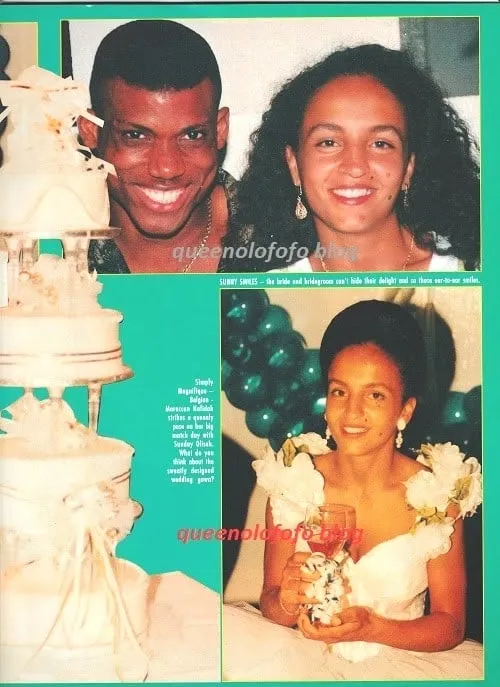
Hafidah and Sunday’s wedding. Oliseh found love in Hafidah, an Ethiopian-Belgian, marrying post-1994 World Cup.
The couple has celebrated more than 20 years of marriage, and they have two lovely kids: a grownup son, Denzel and a daughter. Below is a 2015 photo of Denzel Oliseh and his sister.

With over two decades of marital bliss, the couple cherishes their two children, Denzel and their daughter.
Oliseh once said about his wife..“My wife is a rare and special person, and without her, I would be nothing. During my busy days as a footballer, she stood there by my side, mainly as the boss of the house.”
Oliseh once said his wife and children were angry with him for using his personal money for the Nigerian Football Federation when the organization went broke.
The ThunderBolt Shot:
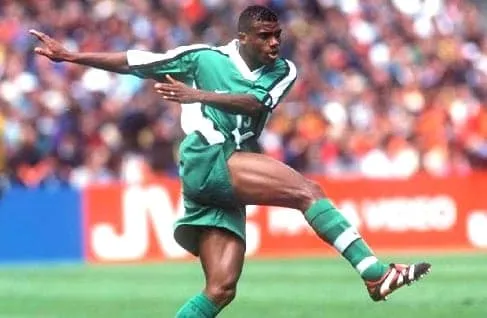
One unforgettable moment football fans associate with Sunday Oliseh is his thunderbolt goal in the 1998 World Cup group stage match between Nigeria and Spain. The powerful strike, fired from 25 yards out, sailed straight into the net, leaving the Spanish goalkeeper stunned and securing Nigeria’s victory.
That electrifying performance not only thrilled fans but also caught the attention of Italian scouts watching from the stands, ultimately shaping Oliseh’s football career trajectory.
Sunday Oliseh Biography – Atlanta 1996 Story:
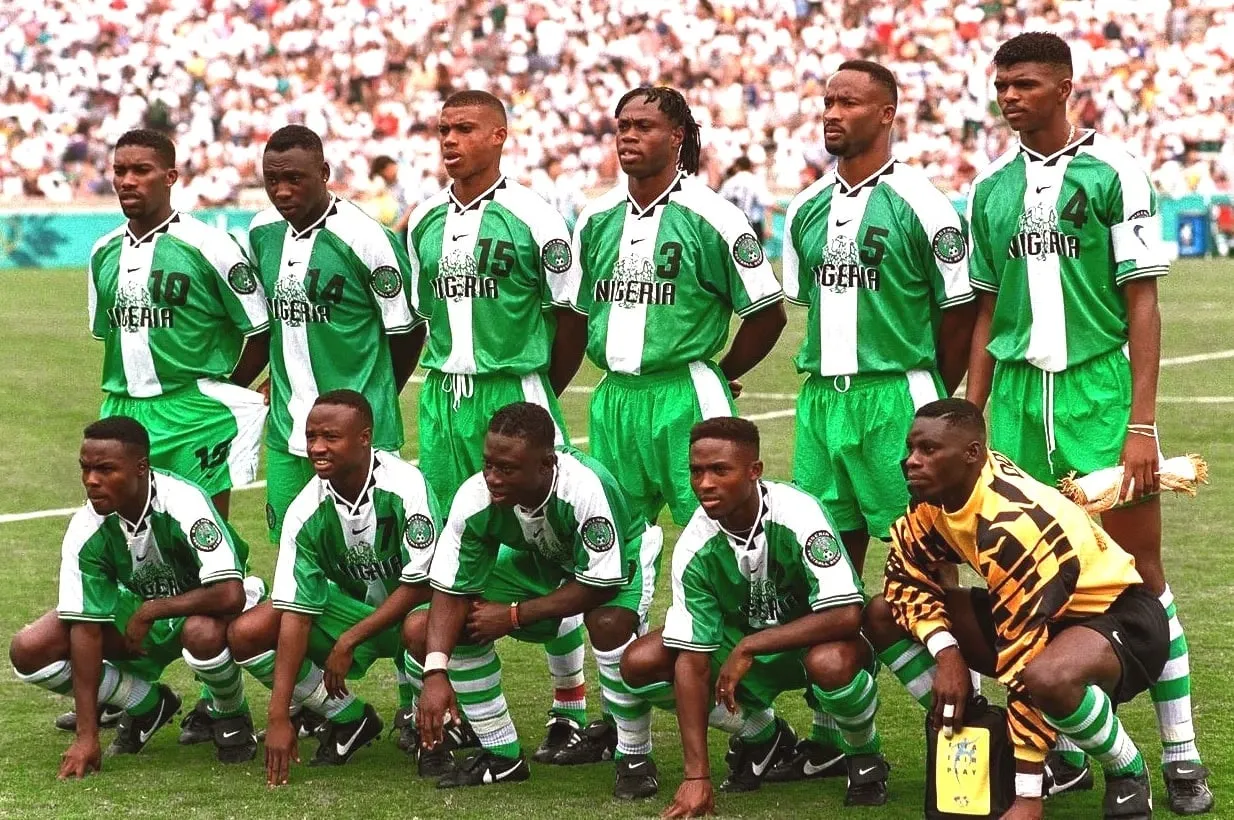
In Atlanta in 1996, Nigeria was so poor as a federation. Nobody knew they would get that far. The team got to the semi-finals in Atlanta and observed there was no hotel arrangement for them.
They stayed in a Motel, a place where men take their girlfriends and mistresses to have quality time. On the major way across, there were five-star hotels where Brazil and Argentina teams stayed.
When Nigeria played the semi-finals with Brazil, thieves ransacked the hotel the Brazilian stayed in and robbed the South American team of their belongings. The Brazilian team lost $55,000 worth of items, and Nigerians didn’t lose anything.
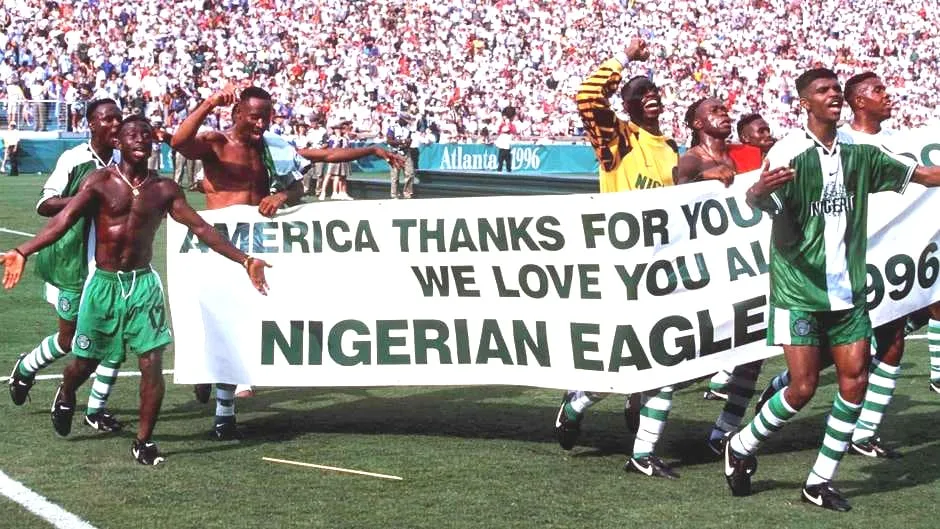
After the Olympics, Oliseh went to Ajax. He was voted Africa’s 3rd best footballer in 1998 by CAF, all thanks to his consistency after becoming a gold medalist in Atlanta in 1996.

Fleeing Nigeria:
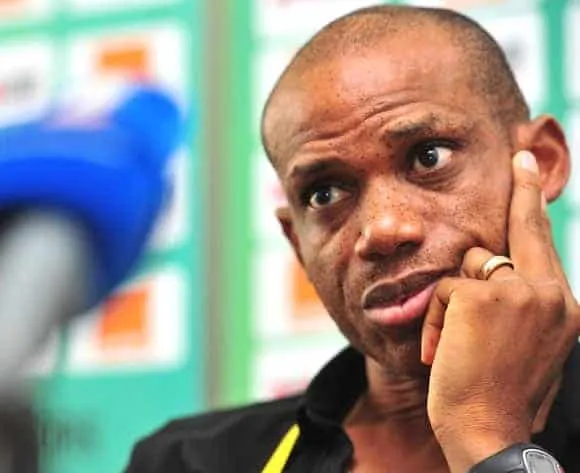
Oliseh was said to be in constant paranoia from fear that certain people were once after his life while he was a Nigerian national coach.
After contracting a virus during one of his official assignments, sources from the camp revealed that the former Juventus player, Sunday Oliseh, believed he was under occultic manipulation by enemies seeking to harm him. In response, Oliseh reportedly vowed to leave the country and distance himself from where these forces could reach him.
In his words…
“One day, while coaching the Super Eagles at Abuja Stadium ahead of the Burkina Faso match, I suddenly felt dizzy, light-headed, and had a headache. I could barely stand. Somehow, I managed to finish the session and then called the doctor to my room, but he had no idea what was happening to me.
Soon after, I began experiencing sleepless nights, a loss of appetite, pains, high blood pressure, and rapid weight loss. Despite several visits to doctors abroad, no one could identify the cause of my illness.
Right before our away game against Burkina Faso, after lunch in Port Harcourt, I was hit with an even worse attack. This time, I couldn’t walk or talk. I felt dizzy, and like I might pass out at any moment. I immediately flew to Germany for a check-up. The doctors told me I had narrowly escaped a total collapse in Nigeria. By that time, I had lost seven kilos. My family was terrified, fearing the worst.
It was clear that if I hadn’t taken that flight to Germany, the outcome could have been much worse. Thank God for His mercies,” Oliseh said.
A source close to the team also revealed that Oliseh had grown increasingly fearful in camp and was suspicious of even his own staff. The coach allegedly warned his staff about witches and wizards trying to sabotage the team’s success.
“He even told some staff to stop putting their hands in their pockets before shaking him, fearing they might be touching objects or charms before offering to shake his hand,” the source added.

Sunday Oliseh Family Life:
As stated earlier, Oliseh comes from a lower middle-class family background. He is not related to Michael Olise, the French footballer who has family roots in Delta state of Nigeria.
Sunday Oliseh grew up with aspirations to follow in his father’s footsteps as an accountant. His father, a professional accountant, had hopes that his son would continue in the same field. However, football unexpectedly took centre stage in Oliseh’s life and redirected his path.
Interestingly, football wasn’t just a career for Sunday; it became a family affair. His younger brothers, Azubuike and Egutu, also pursued professional football careers. Additionally, his elder brother, Churchill Oliseh, plays a significant role in Nigerian football, making the sport deeply embedded in the Oliseh family.
Do you know?… Churchill is one of the persons behind Victor Osimhen and Paul Onuachu‘s early career developments. Churchill (photo below) is the owner of FC Ebeidei. Churchill’s photos have been used by Nigerian fraudsters who scam desperate young footballers who seek a move to play European Football.
Below is a photo of Oliseh’s footballing brothers.
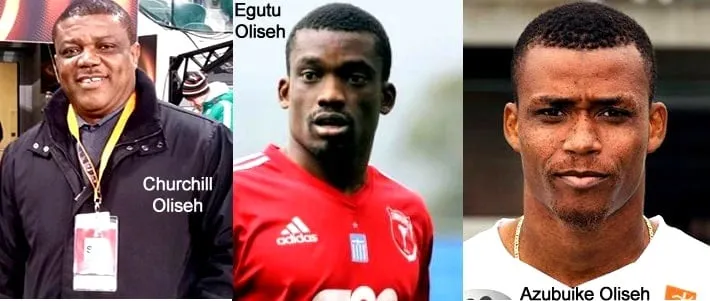
As a source claimed, Sunday Oliseh was the one who set all his brothers up. He doesn’t believe in giving money to his family but believes in setting up his family and friends.
Oliseh is blessed with one sister named Tessy who is a designer and the creative genius behind Tesslo Concept. She is married to Ohimai Amaize, pictured below.

Career Fall:
Despite having the honour of captaining Nigeria during the 2002 African Cup of Nations, Sunday Oliseh faced a significant setback later that year. He was controversially left out of Nigeria’s World Cup squad due to disciplinary issues. This exclusion came as a shock to many, considering his leadership and contributions to the team.
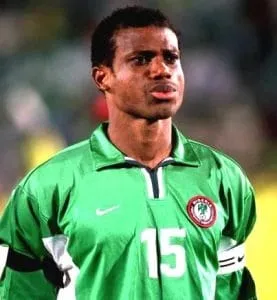
Following his omission from the World Cup squad, Sunday Oliseh made the difficult decision to retire from international football in June 2002. His departure was marked by his leadership role in advocating for the payment of overdue allowances and dues owed to the team.
Reflecting on his experiences playing for Nigeria, Oliseh once expressed his deep passion for the national team, emphasizing the challenges and sacrifices players faced while representing their country.
“For the Nigerian team, the moment you play your first game, you’ll be called a superstar. The moment you play your first bad game, even your parents might call you to say you’ve put them in trouble.”
In March 2004, Borussia Dortmund suspended and later sacked Oliseh. It happened after he head-butted his teammate Vahid Hashemian. The fight occurred while he was on loan from VfL Bochum. Sunday, Oliseh accused him of racism.
In January 2006, Sunday Oliseh announced his retirement from professional football at the age of 31. His final stint was with Belgian top club K.R.C. Genk, where he played for half a season before deciding to hang up his boots.
Post Retirement:
As a soccer player, the worst thing that can happen to one is retirement. When a soccer player retires, the men who are 65 years old still call them babies. This is the case with Sunday Oliseh.
As Sunday Oliseh retired, his family still had hopes for him for financial support. In a bid not to get broke, Oliseh told himself, “There is only one way to keep it going;…continue the education.”.
Oliseh went to North England to continue his education. He did that to get his UEFA Professional Coaches License, which cost him a lot of money.
While that was in progress, he started another journey by becoming a sports consultant. Oliseh worked with a German television station, CNN, and FIFA as part of the technical study group.

Oliseh never went bankrupt after retirement. Unlike most of his friends, Sunday’s case was exceptional. Thanks to his wife, his family developed good spending habits.
Most importantly, starting a coaching career helped him to meet the outsized demands of his family and friends. Oliseh has managed to grow a successful career as a football manager by furthering his education in all things football. Taking a three-year course in coaching and a Diploma in Business Management helped him.
Appreciation Note:
Thank you for reading about Sunday Oliseh, the Nigerian legend who is looking to make a comeback with the Super Eagles after his disappointing departure in 2016. We strive for accuracy and fairness in our quest to deliver the stories of Nigerian Football Legends. The Life History of Mikel Obi and Ademola Lookman will excite you. If you see something that doesn’t look right in this article, please leave a comment or contact us!
